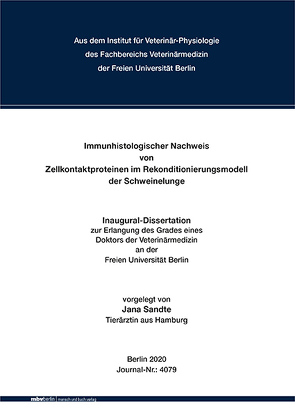
Lungs often have to be rejected from transplantation because they unfortunately include edema, atelectasis and immigrated inflammatory cells or pneumonia (van Raemdonck et al. 2009).
The in vitro reconditioning of lungs as a strategy to improve the mismatch between the need for donor lungs and the organs suitable for transplantation was pursued in a project to optimize a reperfusion model in lung transplants at the University Hospital Eppendorf in Hamburg. In this project, an ex vivo reconditioning system with a protocol for the reconditioning and an as optimal as possible reperfusion cycle was developed. The influence of the system structure and the perfusion solution as well as pulmonary damage by aspiration was also investigated (Wipper et al. 2007, 2008, 2009, 2010, 2011).
The aim of this research was to clarify the extent to which tight-junction, adherence junction and gap-junction proteins change due to the influence of reconditioning, the different system components and the damage of the lungs by aspiration and their different treatments. Additionally an investigation as to how clinical and histological parameters of the project and from this research correlate were conducted. There is already evidence that tight-junction proteins (reviewed by Cummins 2012), adherence binding proteins (De Boer et al. 2008), and gap-junction proteins (Sarieddine et al. 2009) play a role in lung disease.
To clarify this question, an immunofluorescence microscopic examination of the experimental groups of the project was carried out and the intensity of the fluorescence in the respiratory epithelium, endothelium and alveolar septa was evaluated.
As representatives of the tight-junction proteins Claudin-3, Claudin-4 and Claudin-5, Occludin and ZO-1 were selected. β-Catenin and E-Cadherin were studied as representatives of the adherence-binding proteins and Cx43 as representative of the gap-junction proteins.
The results of this study show that changes in the fluorescence intensity of the investigated proteins are observed, compared to healthy lung (prae-group); especially, in the endothelium and attenuated also in the alveolar septa in the aspiration groups of the project, in which also the clinically functional values and the LIS are changed. Claudin-5 and Occludin are reduced there, while Claudin-3 is increased. Cx43 is also elevated in these groups. Interestingly, in the aspiration group, where antithymocyte globulin was added in addition to the reconditioning and the intensive care measures, there are no changes in Claudin-5 and Cx43 and these values are consistent with the good clinical and histological values.
It is also noticeable in the respiratory epithelium that occludin is decreased in the investigated aspiration groups.
In the experimental groups of the closed system, there are hardly any changes in the fluorescence intensity compared to the prae-group. An exception is ß-Catenin, which is partially significantly reduced in the endothelium. However, ß-Catenin is reduced in all groups of the project.
When comparing the closed system with the open system (group 3, which was used as a control group of the aspirational experiments), for some proteins it is noticeable that the closed system is somewhat closer to the condition of the healthy lung. For occludin this is evident in all three localizations (endothelium, respiratory epithelium and alveolar septa) but also for Claudin-5 and Cx43 in the endothelium.
In summary, it can be said that the experimental influences of this project have a clear influence on tight-junction, adherence and gap-junction proteins. This shows that these proteins are involved in the mechanisms that underlie the (patho-) physiological changes.
Aktualisiert: 2022-12-31
> findR *
MEHR ANZEIGEN
Bücher zum Thema tight junction proteins (MeSH)
Sie suchen ein Buch über tight junction proteins (MeSH)? Bei Buch findr finden Sie eine große Auswahl Bücher zum
Thema tight junction proteins (MeSH). Entdecken Sie neue Bücher oder Klassiker für Sie selbst oder zum Verschenken. Buch findr
hat zahlreiche Bücher zum Thema tight junction proteins (MeSH) im Sortiment. Nehmen Sie sich Zeit zum Stöbern und finden Sie das
passende Buch für Ihr Lesevergnügen. Stöbern Sie durch unser Angebot und finden Sie aus unserer großen Auswahl das
Buch, das Ihnen zusagt. Bei Buch findr finden Sie Romane, Ratgeber, wissenschaftliche und populärwissenschaftliche
Bücher uvm. Bestellen Sie Ihr Buch zum Thema tight junction proteins (MeSH) einfach online und lassen Sie es sich bequem nach
Hause schicken. Wir wünschen Ihnen schöne und entspannte Lesemomente mit Ihrem Buch.
tight junction proteins (MeSH) - Große Auswahl Bücher bei Buch findr
Bei uns finden Sie Bücher beliebter Autoren, Neuerscheinungen, Bestseller genauso wie alte Schätze. Bücher zum
Thema tight junction proteins (MeSH), die Ihre Fantasie anregen und Bücher, die Sie weiterbilden und Ihnen wissenschaftliche
Fakten vermitteln. Ganz nach Ihrem Geschmack ist das passende Buch für Sie dabei. Finden Sie eine große Auswahl
Bücher verschiedenster Genres, Verlage, Autoren bei Buchfindr:
Sie haben viele Möglichkeiten bei Buch findr die passenden Bücher für Ihr Lesevergnügen zu entdecken. Nutzen Sie
unsere Suchfunktionen, um zu stöbern und für Sie interessante Bücher in den unterschiedlichen Genres und Kategorien
zu finden. Unter tight junction proteins (MeSH) und weitere Themen und Kategorien finden Sie schnell und einfach eine Auflistung
thematisch passender Bücher. Probieren Sie es aus, legen Sie jetzt los! Ihrem Lesevergnügen steht nichts im Wege.
Nutzen Sie die Vorteile Ihre Bücher online zu kaufen und bekommen Sie die bestellten Bücher schnell und bequem
zugestellt. Nehmen Sie sich die Zeit, online die Bücher Ihrer Wahl anzulesen, Buchempfehlungen und Rezensionen zu
studieren, Informationen zu Autoren zu lesen. Viel Spaß beim Lesen wünscht Ihnen das Team von Buchfindr.
